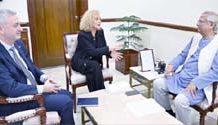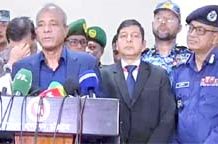C T Online Desk: An inter-ministerial meeting on Sunday decided to intensify security arrangement centring Konarpara Rohingya camps on the Bangladesh–Myanmar border and planned on fencing the vicinity to check trans-boundary crimes.
Squadron Leader Rizwan Rushdee, an official of the Directorate General of Forces Intelligence, and a Rohingya woman were killed during a joint anti-smuggling drive conducted by the Rapid Action Battalion on November 14.
The meeting chaired by home minister Asaduzzaman Khan Kamal also decided to not relocate 4,500 Rohingyas from the no-man’s land, but to install fence around the refugee camps to prevent criminal activities.
An official that attended the meeting told New Age that the Border Guard Bangladesh requested the home ministry seven months ago to erect fence on the Konarpara border to keep trans-boundary crimes including drug smuggling at bay.
The home ministry asked the law enforcement and security agencies to give their opinion in this regard, he said.
‘Many Rohingyas in the no-man’s land or in the Konarpana camps are entering different camps and committing crimes. We need to prevent it,’ said one senior intelligence official who attended the meeting.
The DGFI Cox’s Bazar detachment security assistant sub-inspector Mohammad Anwar Hossain on November 23 filed a case against Arakan Rohingya Salvation Army commander-in-chief Ataullah Abu Ammar Jununi and 66 others for killing their officer.
The DGFI filed the case with the Naikhyangchhari police under Bandarban district naming Ataullah, 48, 31 others and 35 unnamed people accusing them of murder and other crimes.
According to an intelligence official, 17 of the named suspects live in the no-man’s land while the rest are from different places including the Ukhyia and Kutupalang camps in Cox’s Bazar.
New Age spoke to seven officials who attended the sixth meeting of the national committee on coordination, management and law and order at the secretariat.
The meeting also discussed their ‘go and see’ project as home boss Asaduzzaman Khan proposed whether Rohingyas could be ferried from the new jetty set up at Inani of Cox’s Bazar to Bhashanchar directly.
Another official who took part in the meeting said that they wanted Bangladesh Navy continue its management in Bhashanchar.
The government understands that it can accommodate 75,000 more refugees in the island facility managed by the Navy where over 30,000 Rohingyas were earlier relocated.
The meeting also discussed procurement of a well-equipped water ambulance, so patients from Bhasanchar could be transported to nearby Hatiya even if sea turns rough.
Addressing a press conference, the home minister later said that the government was also examining whether the Rohingya leaders were being targeted and killed in the refugee camps.
He said that the government wanted to keep the camps in Cox’s Bazar crime-free and a committee was constituted to examine how to encourage Rohingyas to use Bangladeshi mobile phone connections instead of their native ones.
The home minister added that installation of CCTVs was still pending but the meeting was told that construction of watch tower and installation of barbwire fence were almost done and about to be handed over to the Armed Police Battalion by the army.
The meeting hailed the NGO activities of expanding family planning activities among the Rohingyas while the government is planning to build a hospital at Bhasanchar. The NGOs were also encouraged to expand agricultural activities in the abandoned Bashanchar land.















